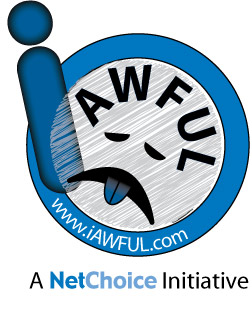If only our would-be “Net Nannies” in Congress, the FCC, FTC, state capitols and, of course, Brussels were more like the Park Service! The WSJ reports on “Why there are so few guardrails at the Grand Canyon:”
Sunday a crowd gathered in Acadia National Park, on Mount Desert Island along the Maine coast, to watch the surf, roaring with energy from an offshore hurricane, smash against the shore. A towering wave crashed over some onlookers, dragging half a dozen into the ocean. A 7-year-old girl drowned. Soon it was asked why officials had let the crowd get so near waters so dangerous. “The Park Service’s goal is to get people out into the park,” Acadia Chief Ranger Stuart West told Maine Public Broadcasting. “And we don’t want to take that opportunity away from the public.”
It’s a measure of how coddled we’ve become that Mr. West’s simple and reasonable statement seems almost shocking. But the Park Service, with its emphasis on protecting the lands in its care, has developed a refreshingly laissez-faire attitude toward protecting visitors….
It seems that those who frequent the outdoors have an aversion to nanny-statism, which allows the Park Service to take a grown-up attitude toward its visitors: “Their safety is their responsibility,” says Ron Terry, Zion’s public information officer. “We couldn’t possibly put railings up everywhere. It wouldn’t be feasible, nor would we want to.”
Amen! If only we took the same approach to the online environment: educate users about the risks (real or subjective) to their privacy, safety or delicate sensibilities and empower them to the maximum extent possible to make decisions for themselves—or for parents to decide which “perilous canyon trails” to let their kids go down. The wonderful, unique thing about the online environment is that each user’s experience can be customized: Technological filters tools allow parents to create “guardrails” just for their kids (e.g., blacklists of sites inappropriate for kids), without needing to have a guardrail installed for all users (e.g., COPA).
The parallels continue when one considers the human tendency to mis-perceive risks, which creates “technopanics” in Internet policy just as it creates panics about the various health risks of the great outdoors: Continue reading →
 Randy Cohen, who pens “The Ethicist” column for The New York Times Magazine, wrote this week about the “skank case,” or the controversy surrounding the recent legal outing for an anonymous blogger who called fashion model Liskula Cohen a “psychotic, lying, whoring … skank.” Thanks to a recent court decision, we now know that the blogger who uttered those words is Rosemary Port, a 29-year-old Fashion Institute of Technology student. And she now apparently plans to sue Google for revealing her identity to the court. [As a shameful aside, can I just say that there has never been a nerdy Internet legal battle that involved two more smokin’ hot women than this! Sorry, I couldn’t resist pointing out the obvious.]
Randy Cohen, who pens “The Ethicist” column for The New York Times Magazine, wrote this week about the “skank case,” or the controversy surrounding the recent legal outing for an anonymous blogger who called fashion model Liskula Cohen a “psychotic, lying, whoring … skank.” Thanks to a recent court decision, we now know that the blogger who uttered those words is Rosemary Port, a 29-year-old Fashion Institute of Technology student. And she now apparently plans to sue Google for revealing her identity to the court. [As a shameful aside, can I just say that there has never been a nerdy Internet legal battle that involved two more smokin’ hot women than this! Sorry, I couldn’t resist pointing out the obvious.]
 Reflecting on this catfight in his NY Times Magazine editorial, “Is It O.K. to Blog About This Woman Anonymously?” Randy Cohen asks:
Reflecting on this catfight in his NY Times Magazine editorial, “Is It O.K. to Blog About This Woman Anonymously?” Randy Cohen asks:
Has anonymous posting, though generally protected by law, become so toxic that it should be discouraged? It has. To promote the social good of lively conversation and the exchange of ideas, transparency should be the default mode. […]
Here is a guideline. The effects of anonymous posting have become so baleful that it should be forsworn unless there is a reasonable fear of retribution. By posting openly, we support the conditions in which honest conversation can flourish.
But Mr. Cohen never specifies whether he is talking about an ethical guideline or a legal guideline. There is a world of difference, of course. As a matter of social or personal ethics, I think many of us would agree that anonymity “should be forsworn” and we should encourage people to “post openly.” I always live by that rule myself when blogging or posting comments on other sites, whether they are blogs, discussion boards, or even shopping sites. But that is my choice. I would not want that choice forced by law upon others. Continue reading →
 My friends Anne Collier and Larry Magid, two of America’s leading experts on Internet safety matters, have just released a terrific new “Online Safety 3.0” manifesto. Anne is the editor of Net Family News, Larry pens the “Safe and Secure” blog for CNet News, and together they run ConnectSafely.org. Everything they do is must-reading for those of us who cover and care about the intersection of online child safety and free speech issues. [Disclosure: I am currently serving along with Anne and Larry on the new, government-appointed Online Safety Technology Working Group.]
My friends Anne Collier and Larry Magid, two of America’s leading experts on Internet safety matters, have just released a terrific new “Online Safety 3.0” manifesto. Anne is the editor of Net Family News, Larry pens the “Safe and Secure” blog for CNet News, and together they run ConnectSafely.org. Everything they do is must-reading for those of us who cover and care about the intersection of online child safety and free speech issues. [Disclosure: I am currently serving along with Anne and Larry on the new, government-appointed Online Safety Technology Working Group.]
In their new “Online Safety 3.0” essay, Anne and Larry argue that:
Both the Internet and the way young people use technology are constantly changing, but Internet safety messages change very slowly if at all. A few years ago, some of us in the Net safety community started talking about how to adjust our messaging for the much more interactive “Web 2.0.” And we did so, based on the latest research as it emerged. But even those messages are starting to get a bit stale.
 Their “Version 3.0” for online safety refocuses the discussion on “the positive reasons for safe use of social technology.” They want to”enable[] youth enrichment and empowerment. Its main components — new media literacy and digital citizenship – are both protective and enabling.” They argue that “promoting critical thinking, mindful producing, and the ethics, responsibilities and rights of citizenship” is “empowering because it’s protective. This is protection that lasts a lifetime.” Amen to that.
Their “Version 3.0” for online safety refocuses the discussion on “the positive reasons for safe use of social technology.” They want to”enable[] youth enrichment and empowerment. Its main components — new media literacy and digital citizenship – are both protective and enabling.” They argue that “promoting critical thinking, mindful producing, and the ethics, responsibilities and rights of citizenship” is “empowering because it’s protective. This is protection that lasts a lifetime.” Amen to that.
What I like best about Anne and Larry’s approach is that is fundamentally optimistic. Whereas so many supposed child safety experts talk down to both parents and kids and seem to suggest that both are completely oblivious to the world around them, Anne and Larry have a very different worldview and approach. They are positive about the potential of both parents and kids to take on new challenges and make the best of the new technologies they have at their disposal, even if there are some bumps along the way. The other thing I love about Anne and Larry is that they have done more than any two journalists I know to debunk the “technopanic” hysteria that others in the media world have propagated over the past 15 years.
Anyway, make sure to read their “Online Safety 3.0” manifesto. Best thing I’ve seen on the subject in a long time.
Just caught this LA Times editorial from a couple of days ago on the “Overreaction to Online Harassment.” The piece makes many of the same points that Berin Szoka and I stress in our PFF paper on “Cyberbullying Legislation: Why Education is Preferable to Regulation.” [Also, here’s a video of a debate on these issues that I took part in up on Cap Hill this summer.]
The Times editorial notes that, “Because of a past tragedy, lawmakers and prosecutors are becoming overzealous in combating noxious behavior on the Web.” Specifically, they are referring to the tragic case of Megan Meier, the teen who committed suicide after being harassed on MySpace. “Members of Congress often try to expand the powers of federal prosecutors and courts when state law doesn’t produce the results they seek, especially when confronted with cases as heart-wrenching as Meier’s,” the Times noted. For example, in may 2008, Rep. Linda Sánchez (D-CA) introduced H.R. 1966 (originally H.R. 6123), the “Megan Meier Cyberbullying Prevention Act,” which would create a new federal felony to deal with this concern.
But creating a federal crime for something that is mostly peer-on-peer activity seems like overkill. Moreover, the Times notes, “the bill is so vaguely written” that it “would have a hard time withstanding a 1st Amendment challenge if it ever became law.” As you’ll see in our paper, Berin and I agree, but we also point out that cyberbullying is a very serious matter since evidence suggests the cyberbullying is on the rise and that it can have profoundly damaging consequences for children.
Continue reading →
I like this new document about guarding your online reputation that has just been jointly published by Reputation Defender and the Internet Keep Safe Coalition (iKeepSafe). They list these “3 Key Tips for Parents” for how to deal with concerns about their children’s online safety, privacy, and reputation:
1. Keep Current with Technology: Talk to teachers about what forms of Internet safety tools they implement in computer labs and technology classes, consider these safety tools for home use, and stay up-to-date on the capabilities of any mobile devices your child may have.
2. Keep Communicating with Your Kids: Find out who your child talks to online, educate your kids about the permanence of any “digital footprints” they leave behind, limit the use of social networks, and make it a habit to engage your kids in critical conversation—the more you talk to your kids about their online usage, the more they will learn to use digital products in a safe and healthy manner.
3. Keep Checking Your Kid’s Internet Activity: Keep computers in a central public location, check your child’s browsing histories, and limit your child’s computer time—there’s a whole world of outdoor and offline activities where they should be involved!
All good advice. I especially like their focus on getting parents to communicate early and often with their kids. It’s something I have beat the drum about quite a bit in my own work on the subject. Continue reading →
On July 27th, The Progress & Freedom Foundation hosted a Capitol Hill panel discussion entitled “Online Child Safety, Privacy, and Free Speech: An Overview of Challenges in Congress & the States.” The event featured remarks from:
- Parry Aftab, Executive Director, WiredSafety.org
- Todd Haiken, Senior Manager of Policy, Common Sense Media
- Jim Halpert, Partner, DLA Piper
- Berin Szoka, Senior Fellow, The Progress & Freedom Foundation
We’ve just released the transcript of the event, which I have also pasted down below the fold in a Scribd document reader. Also, the audio for this event can be heard by clicking below:
Here is the full event description: Continue reading →
 Back in June, NetChoice introduced the iAWFUL (the Internet Advocates’ Watchlist for Ugly Laws) list as part of a broader effort to push back against America’s worst Internet legislation. Two months have passed, and while many of the bills in the top 10 have changed, they remain every bit as AWFUL.
Back in June, NetChoice introduced the iAWFUL (the Internet Advocates’ Watchlist for Ugly Laws) list as part of a broader effort to push back against America’s worst Internet legislation. Two months have passed, and while many of the bills in the top 10 have changed, they remain every bit as AWFUL.
Earlier today NetChoice unveiled the first major update of iAWFUL, which lists the 10 worst Internet bills/laws in America. The updated list includes five new items, with new laws in the top 2 slots.
It’s worth mentioning a few that fell off the list, in large part thanks to the pressure that Internet advocates exerted through iAWFUL:
#2 on the June iAWFUL list was a California bill that would have forced unworkable technical restrictions on the posting of photos to social networking pages. The bill’s sponsor responded by working with Internet advocates to fix problems with the measure.
#3 on the June iAWFUL list was a bill in Connecticut that would have required sales tax collection by out-of-state businesses that pay commissions to in-state affiliates. The Governor heard our concerns about the impact on in-state publishers and school charities, and has thus far kept this measure off the table in budget negotiations.
#5 on the June iAWFUL list was a Connecticut bill to let police conduct searches of homes where goods were being stored by online dealers – without having to obtain a search warrant. Thanks to iAWFUL publicity, this bill stalled in the House.
This is what iAWFUL is all about: creating positive change through informed advocacy.
Now for the bad news. For every measure that fell off the iAWFUL list, we found a truly AWFUL replacement. Continue reading →
An Illinois bill to ban convicted sex predators from social networking sites (HB 1314) is now law. Gov. Pat Quinn signed the bill yesterday. Even if predation on social networking sites is very rare, we certainly prefer to see efforts that target bad actors instead of tech mandates or age verification requirements. Given the broad definition of “social networking website” in the law, the ban might apply to many types of Internet sites.
Definition:
“Social networking website” means an Internet website containing profile web pages of the members of the website that include the names or nicknames of such members, photographs placed on the profile web pages by such members, or any other personal or personally identifying information about such members and links to other profile web pages on social networking websites of friends or associates of such members that can be accessed by other members or visitors to the website. A social networking website provides members of or visitors to such website the ability to leave messages or comments on the profile web page that are visible to all or some visitors to the profile web page and may also include a form of electronic mail for members of the social networking website.





 Back in June,
Back in June,  The Technology Liberation Front is the tech policy blog dedicated to keeping politicians' hands off the 'net and everything else related to technology.
The Technology Liberation Front is the tech policy blog dedicated to keeping politicians' hands off the 'net and everything else related to technology.